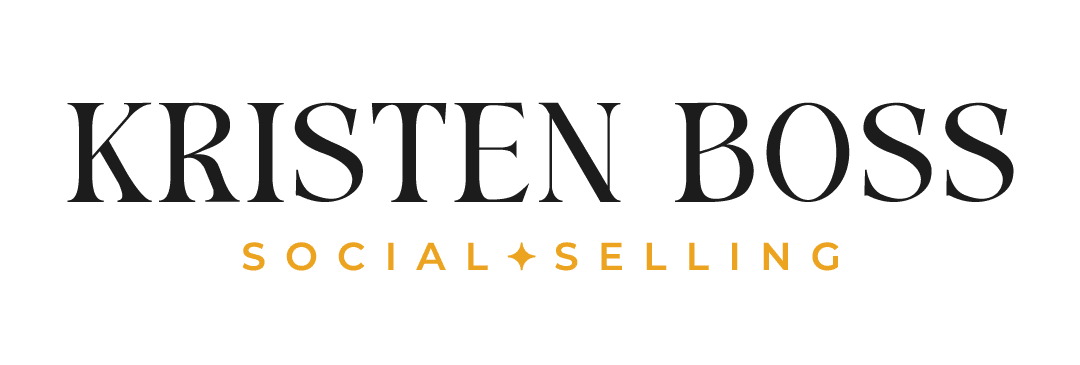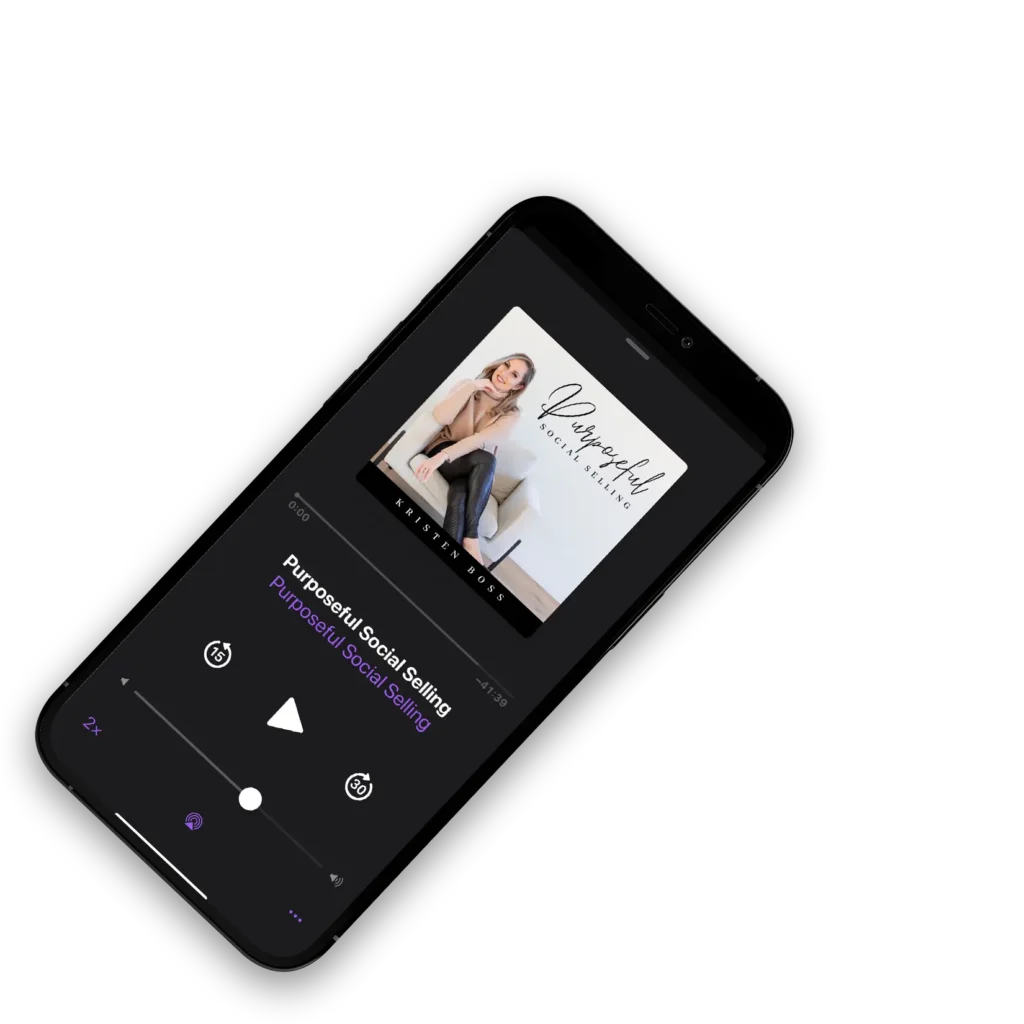In today’s world, we’ve grown accustomed to instant gratification. With just a click or a tap, we can access answers to our questions, order products for same-day delivery, and receive immediate feedback on our actions. This convenience, while undoubtedly beneficial in many ways, has created a society that is dopamine-dependent, and it’s profoundly influencing behavior, particularly in the realms of business and personal development.
We crave the quick fix, the instant result, the satisfaction of a click or a swipe. This dependence on dopamine has significant consequences, particularly when it comes to our aspirations and goals. In today’s episode, Kristen dives into how this dopamine dependency can play a role in your business.
Let’s look at a few highlights:
- There’s no such thing as a one-click business or an overnight success. However, the allure of instant gratification often distracts us from the path of patience and perseverance.
- We want instant results, and we want them overnight. Marketers are well aware of this tendency, and they often cater to our desire for quick wins and immediate satisfaction.
- Adopting a delayed gratification mindset involves the discipline to work steadily toward a goal, even if the rewards are not immediate.
To truly achieve our goals and build lasting legacies or businesses, we must embrace delayed gratification, cultivate discipline, and be prepared to weather the storms that come our way. In our pursuit of personal and professional growth, we must remember that the most substantial achievements often come from enduring the journey and being prepared for both the highs and lows along the way.
Introducing the Social Selling Leadership School: A 12-week Advanced Leadership Certification program for Network Marketers. This program was designed to give you everything you need to be a confident and transformational coach for the people you serve and help your team get massive results. This is the ONLY Coaching Certification program built specifically for the social selling market. Find out more and join the waitlist here!.
Thanks for listening! Do you have a question about network marketing? Kristen can help! Drop your question here, and she just might answer it live on the podcast: https:/Kristenboss.com/question
If you’re ready to learn the simple process of running your social selling business online, you have to check out Kristen’s live group coaching program! The Social Selling Academy: www.thesocialsellingacademy.com
Transcript for Episode #183: The Dopamine Problem
Kristen Boss (00:19): You are listening to the Kristen Bos podcast. I’m your host, Kristen Bos. As a bestselling author and performance coach, I’m on a mission to share about sustainable and purposeful approaches to both business and life. Each week, I bring relevant topics that I believe are necessary to create a life of purpose, significance and meaning. Entrepreneurship is about so much more than growing your bottom line. It’s about who you are becoming in the process and building a life that is truly extraordinary. Entrepreneurship is really just the beginning.
Kristen Boss (00:57): Hey, bosses. Welcome to another episode of the podcast. This week we’re going to talk about something that I’ve talked about, but not quite as in depth as I’m about to today. And I think it’s the number one reason why people quit too soon, why they constantly switch between different strategies, why they don’t stick with things long enough to actually see long-term results and why most people aren’t seeing big wins in their business or even in other areas of their personal life, things that they’re working on improving on. And that is what I’m going to call the dopamine problem and how we as a society, I was thinking about this just the other day. I saw just a really funny Instagram meme or a caption that said, would you throw yourself back into 1985 without a phone, and would you want to relive that? And I was like, yes, that’d be amazing.
Kristen Boss (01:50): But then I thought about it, I was like, wait a minute. Then I wouldn’t be able to Google any question I have in the moment. I’ve just gotten very used to, and this is kind of the day and age we live in, the moment we have a curiosity about something, we can immediately just run to this handheld device in our pocket or in our purse and immediately get answers for the questions that we have. We don’t have to go to the library. We don’t have to do this big research project. Everything happens lightning fast now, which is amazing. But in a lot of ways, I think it has really done us a huge disservice when it comes to our personal growth, when it comes to improving different areas in our life. And it has made us very dopamine dependent with how we move about in our life.
Kristen Boss (02:40): Whether it’s saving money for a trip, whether it’s with weight loss or health, whether it’s saving up for vacations or putting money in your retirement or building a business, anything that requires time and patience. We now have brains because we are constantly exposed to instant gratification. I mean, think about it, with Amazon, you can have however many things just shipped to your house depending on where the closest warehouse center is. You can have it same day if you want, just with the click of a button, you can have those shoes you want. You don’t even have to go to Blockbuster anymore to go watch your favorite movie. Everything is streaming. Everything is convenient, everything is one click away. Everything is so easy. There’s very little resistance to get what we want in our life. However, I find the things that we want most, the big desires, the big things like financial freedom and building a family legacy and building a business where you can be in charge of your own time and have options and all of those things.
Kristen Boss (03:45): That takes a lot of time. It takes a lot of grit. There’s no one click insta business where you magically are making a hundred thousand dollars a year. There is no such thing. However, we tend to operate. I see people moving about in the world with those type of expectations, and I see people falling prey to the, I’m going to call it the easy button or the dopamine button, whatever, wherever instant gratification is. That’s often where we flock. And here’s the thing is, in our daily life, instant gratification is everywhere. It’s absolutely everywhere. And when you think about, oh, I think for me, I’ll be on Instagram and I’ll follow some influencers who are sharing their outfit of the day, and suddenly they’re like, okay, and here’s my links, and I follow their links and I’ll go from watching a reel to making a purchase on Amazon in 90 seconds.
Kristen Boss (04:37): And immediately, two days later, that same outfit that I watched somebody wear is on my doorstep. And my husband’s like, didn’t you just order something? I’m like, yes, this step, right? But for me, it’s like it’s constantly, it’s instant. What I want, I can have right here, right now. But this gets in the way of our growth where most of the really amazing, extraordinary things we build in this life, the things that outlast our lifetime legacies, businesses, all of those things to have a lot of success, true measures of success. There’s no such thing as instant gratification, but we have brains that are wired to constantly be seeking out dopamine. And we don’t just do this with our purchases and with Instacart or Amazon or whatever it is. It’s not just there. It’s actually, it happens in our business. I see we can chase dopamine in our business constantly.
Kristen Boss (05:30): And what happens is when we become dopamine dependent, it’s actually very addictive to our brain chemistry and our brain constantly is just once we have our fix, it goes seeking for the next hit of dopamine. Wherever you may find that. So some people, it might be scrolling, it might be food, it might be drink, it might be shopping. Just notice if you were to reframe it and see it as like, oh, what I’m is dopamine seeking right now, then we’re at least aware of what’s happening and realizing that we’re responding to a brain needing a fix. And it really is like an addiction. And think about how often you’re tempted to just reach for your phone for no reason. It’s just impulse and it’s your brain is just constantly seeking the feedback. It’s a feedback loop for the dopamine. And so I noticed that we do this in our business in a couple ways.
Kristen Boss (06:28): One is when you are building your business, when you’re starting out, you’re constantly looking for reinforcement or feedback that you’re doing something right? So when you make a post and when you get likes and comments, you actually get little dopamine hits from that. And so constantly you’re wanting to recreate that. Just like I want you to think about if you’ve ever gone viral for you with a post, maybe you viral for you was like 2000 views. Maybe for some of you it’s a million views. Notice that the feeling, the delight that you felt over that video going viral, how long did it last you a day, two days. Eventually the anomaly of it wears off, and then your brain actually goes out to figure out how can I recreate that experience to get the same dopamine hit from that experience? So this is where I see people seeking and chasing, not just validation for, I want to feel better about myself, not from a place of insecurity, but sometimes we show up in business looking for a dopamine fix.
Kristen Boss (07:30): I want the likes, I want the comments, I want the shares. I want the feedback. That’s all dopamine that our brain is going to seek. So oftentimes this is when I see people frustrated that if they’re not getting traction on their social media that they are building because it takes time to build a following. It takes time to build a bot in audience who enjoys consuming your content and regularly engages with you. That takes three to six months of consistency if you’re starting from scratch. And if you don’t know that you need to know it now. It takes 90 days up towards six months of consistency to actually build an audience that is bought into you, bought into your content and engages with you regularly and often. But how many people are like six months? Okay, I’m signed up for that. No, everyone wants instant results.
Kristen Boss (08:17): They want 10,000 followers overnight. And what’s worse is I see people kind of marketing to that instant gratification, like fast, easy, overnight, and people fall prey to it over and over again because there’s no, we as a society, I believe we have lost our ability to value delayed gratification. Very few people know how to actually have delayed gratification and have impulse control on their way to actually acquiring what it is that they want. Delayed gratification is everything. In fact, there was a study done by Stanford in 1972, at least I think it was Stanford. I’m going to just check my, yes, it was Stanford in 1972. They called it the marshmallow experiment, and maybe you’ve seen it on TikTok or a reel or somewhere. And what they did was they took a child and they presented the child with two options. They’re like, okay, you can have one marshmallow and eat it now, but if you wait until we come back and the marshmallow is still there, then you can have two marshmallows.
Kristen Boss (09:23): So again, what they’re speaking to is impulse control and instant versus delayed gratification. And it was fascinating that they noticed that most of the kids just went for the instant gratification of the marshmallow, even if they knew they were even told ahead of time. If you wait, you get two marshmallows. And even knowing that it would be double the reward if they waited, their brain was still wired for instant gratification. This is what I see people do in their business all the time, is they immediately they see someone marketing to, but have the marshmallow now have it, now have it now, have it now. Instead of like, Hey, I’m going to teach you the skills. And if you play the long game, you’re going to have two marshmallows if you do it. But most people are so impatient, they’re so frustrated, they’re so eager. They’re like, yeah, but I want it now and I don’t want to wait that they eat the marshmallow immediately.
Kristen Boss (10:13): They do the thing for the quick fix instead of waiting for, hold on. If I learn to play this game, I get double the reward. That is true in business, but most people don’t have the discipline for delayed gratification. And this is when I see people give up, they say, oh, it’s not working for me. Yeah, I tried that. It’s not working. I’m like, you didn’t try it long enough. That’s almost always the case when I talk to people is they didn’t try it long enough or consistently enough. And you don’t get results by what you occasionally do. You get results by what you do and what you do consistently over a long period of time. But most people are out there doing things occasionally wondering, where’s my results? And then they get frustrated because there’s no dopamine coming in right away to reinforce that they’re doing the right thing.
Kristen Boss (11:01): They get fed up, they get frustrated, and they go for what feels easy and quick and fast. I’m going to give you an example of this outside of business because I was guilty of this is like it could be with weight loss. You’re doing your habits, your weight training, you’re getting your steps in, you’re getting your water, you’re making good nutritious choices. Maybe you’re doing good nutritious choices five out of seven days a week, and maybe you’re having a little bit of fun on the weekends. And then after three weeks of doing this, because it feels like an eternity at this point, you get on the scale and you haven’t even lost a pound. Maybe you’ve lost a half a pound and suddenly you’re just outraged. What? I’m eating all this nutritious food. I’m going to the gym, I’m drinking my water, I’m getting my steps, and I’ve only lost a half a pound.
Kristen Boss (11:46): And then this is when people throw their hands in the air and they say, it’s just not working for me. It doesn’t work. I need to go do something. And then immediately, because they’re in a frustrated place, their brain goes into, okay, let’s find a quick win here. I need some dopamine because I’m frustrated. So that is when they see, I’m going to call it infomercial, shiny ball syndrome, that’s like right at the perfect time. They’re the perfect prime candidate for a commercial to pop in out of nowhere and be like, are you tired of trying all the things and not losing weight? And they’re like, yeah, I am tired. Do you feel like you’ve worked so hard and still not had any results? They’re like, yeah, that’s me. And they’re like, well, it could be easier than you think and just try this 48 hour drink that you drink two times and lose five pounds overnight.
Kristen Boss (12:34): Now everything in their brain is lighting up with like, yes, that’s what I need. All these other things don’t work. And they go for the fast and easy button. That’s the one marshmallow. They’re like, I’m going to grab the one marshmallow. So what they do is they do the detox. They drink only water for two days, and inevitably they drop three pounds. And then guess what? And they get the instant gratification of seeing the scale go down. And I am using this example. I think it’s a really great parallel with business. They get the instant gratification of watching the numbers go down, but what they didn’t do was create a sustainable habit to keep the numbers down. So what do they end up doing? They end up going back to their old habits, whatever it is, eating the foods that they were eating, not having the activity levels the same as normal, and they go right back to where they were and they create this cycle instead of, hold on.
Kristen Boss (13:27): And this was true for me. For me, I will be honest with you, and I will tell you, I was always chasing the fast fix when it came to my health. I was always looking for like, okay, what’s the easiest fastest way for me to get there? I was hook, line and sinker. Every time I saw someone say like, oh, I didn’t change my eating habits and I didn’t even have to work out and I lost weight. I bought whatever they were selling every single time because my brain was just constantly looking for the easy way out. It was constantly just grabbing the single marshmallow instead of the two marshmallow idea would’ve been, okay, I’m going to learn how to eat sensibly, balance my nutrition, make sure I’m getting adequate intake of protein. I’m going to make sure I learn to portion my foods correctly.
Kristen Boss (14:14): I’m going to learn to exercise and stay active and build it into my lifestyle so that I have these habits so that whatever weight I lose, I’m going to sustain it for the rest of my life. And even if it means the weight loss is slower than if I was to do something faster over here, and so I had to give up my dopamine instant gratification fix when I set on my own journey, and I will say this for me guys, the first four weeks in my journey, the scale was doing almost nothing. It would go down a pound and then up three down a pound and then up. It just kept hovering. And I remember my frustration was so high because I was used to trying other things like fad diets, fast fixes, and seeing the scale don’t go down real quickly. And what was happening was I was kind of deconditioning my brain to separate itself from needing all the fast fixes and the dopamine and my brain was having to actually find value in the habits and the process.
Kristen Boss (15:18): And I had to keep telling myself, okay, but there’s two marshmallows coming. There’s two marshmallows coming. I’m learning this for the rest of my life. And because I did that, I was like, okay, here’s all the habits I’m doing. And I kept going and I kept going. And then what do you know eight weeks later, oh, suddenly, okay, I’m down eight pounds. It might’ve been easy to do in two weeks with this fad thing, but it never stayed off. The weight always came back, always, always. And now it’s like, okay, I finally have the results I want because I started to have a different mindset. I gave up instant gratification, and I decided I’m willing for it to take longer because I know the reward will be double later. It is no different when it comes to building the skills and habits for your business.
Kristen Boss (16:02): Everything in you is going to want to be wired for fast rewards, fast payoffs when you’re starting your business. And oftentimes when people have interviewed me about my business, they’re like, oh, it grew really fast and grew overnight. I’m like, yeah, but it might seem that way to you. But I had a whole year where I was putting in the time coaching people for free. I was told no a thousand times, and that whole year was my year of delayed gratification. My year of like, okay, how bad do I actually want it bad enough to keep going and trying at this even though I’m not getting the dopamine of quick wins? And the feedback of like, yes, this feels good. No, I was willing to have delayed gratification. I was willing to hone my habits, to hone the process because I believed in the long-term reward.
Kristen Boss (16:52): And that really is this whole thing with dopamine is like dopamine is all about the short-term. It’s all about what I can have and what I can have right now. Whereas if you want to build a legacy, if you want to build a business that your children’s children still talk about, you have to become somebody who values delayed gratification. And Alex Ozzi talks about this all the time in his content. He’s like, you have to have delayed gratification. If you are constantly chasing the fast fix, the quick wins, the overnight things, then you are just somebody who’s constantly dopamine dependent. I will also say this, if you are dopamine dependent in your business, you won’t be able to weather hard seasons and hard seasons happen in every single business. I don’t care what business you’re in, but when you are somebody that’s dependent on dopamine to stay motivated in your business, that means you have to always be in a winning season.
Kristen Boss (17:42): And that’s just not how life goes. Business isn’t always a winning season. You are going to have losing seasons, and they’re going to be really hard. And there’s really no place that dopamine is lighting up in your brain when it feels like everything’s going wrong, when it feels like your business is falling apart or you’re never going to be able to turn things around. If you are somebody who is constantly dopamine seeking, this is what’s going to happen. The first sign of struggle or frustration in your business when you’re in a non-winning season, you are going to be the most easily distracted person because you’re suddenly, instead of digging deep, instead of digging deep and really leaning into your growth, you’re going to be somebody who’s just chasing what feels better. You’re just going to want to be like, I don’t want to deal with this.
Kristen Boss (18:30): And suddenly you are going to be, again, the infomercial ideal person where someone’s going to pop up with this real shiny promise that says, Hey, are you frustrated with the business that’s not helping you and you’re putting in all your time and no one appreciates you, and you just feel like you’re working for somebody else? You’d be like, yeah, yeah, yeah. And they’re like, well, come over here. Over here is easy. Over here. You can have fast winds overnight, and it’s all unicorns and rainbows and butterflies and all that, and they’re not marketing the full story of it might be for a minute because you’re going to be lighting up on all kinds of dopamine because you’re doing something different. And then inevitably, a hard season is going to happen there too. And I’m not saying sometimes you do have to pivot and move directions to find something that’s a better fit for you.
Kristen Boss (19:21): And I’m not saying that’s wrong. What I am saying though is if you are simply changing things up when it’s hard because it feels hard and you don’t know how to be somebody who weathers hard seasons and truly knows how to have delayed gratification and gives up your need for instant gratification, you’re going to constantly be the person who gives up runs, goes the other way, looks for the fast fix. As soon as it gets hard somewhere else, I’m totally fine. If you were like, I wanted to make a change in my business, and even if you were to tell me, I know it’s going to be just as hard and frustrating over there, but at least that’s a hard and frustrating that I’m signing up for, and I want that, and I understand that I totally, I’m all for that. If you’re like, I know it’s just going to be just as hard over there.
Kristen Boss (20:08): There’s going to be hard season and it’s going to be miserable. But I had rather have that hard choose the hard you sign up for essentially. But this idea of it’s when people think that over there or something better when they think fast and easy is going to stay and it never does, it’s a flashy promise, and it’s usually when we’re distracted, and it’s usually when we’re chasing the next, the hit of dopamine, what feels really good in your business? And so in other ways that we chase dopamine in our business is when we are needing our business to make us feel good about ourselves. Like, oh, when my income is at its highest, when I’m raking in these big checks, when we have these big launches or these big numbers, if that is how you are defining yourself, then you’re only going to be as good as your last launch or your last highest earning month.
Kristen Boss (21:05): And that’s a miserable place to be because if you define yourself only by your successes, you’re going to be miserable because you’re going to constantly be chasing the next success, and it has to be bigger and better than the last one because you’re looking for that next dopamine fix because you’re looking for that next big win to make you feel good about you. I’ve heard about this in the movie industry that a lot of actors struggle with. This complex is this idea of you’re only as good as your last role. You’re only as good as your last movie or musicians. They’re only as good as their last hit song. Just notice how they’re always going and creating. They’re trying to create the next hit song, and then it diminishes. The feeling is fleeting, and there’s nothing wrong with ambition and performing and really wanting to reach your highest potential.
Kristen Boss (21:56): But just notice if you are somebody that’s constantly looking for the reinforcement of dopamine to either feel a certain way about yourself, to have a sense of identity, any of those things, you’re setting yourself up for so much pain. So what I would encourage you to really think about is where in your life are you constantly giving up the two marshmallows, like double the reward for the fast fix? Where are you constantly giving into your impulses and just grabbing the one marshmallow because you aren’t willing to have the delayed gratification and learn the lessons and become who you become while you are waiting is where all of your growth is. All of your growth happens as an individual and as a business owner while you’re waiting in the delayed gratification. I think every time we kind of fall prey to our impulse control, we’re not a master of ourselves. We are now. We are a slave to our desires. It’s like, whatever sounds good now, and that’s always going to be competing for our time. But when you become somebody who is intensely focused on where you’re going and you are willing to really harness your impulse control and have impulse control and sign up for delayed gratification, the reward is going to be so much sweeter. So think about that this week. We’ll catch you in the next episode.
Kristen Boss (23:27): That’s a wrap for today’s episode. Listen, if you love what you heard here today, I would love for you to leave a real quick rating and a review. This helps the show get discovered by new people. Be sure to take a screenshot of today’s episode and shout us out on Instagram. We’ll shout you right back out. If you’d like to find additional resources or discover how to work with me, head to kristenboss.com










